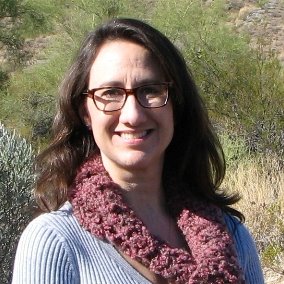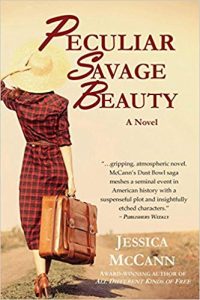Yard Work Makes Me a Better Writer
By Jessica McCann
 A curious epiphany followed the release of my second novel: yard work makes me a better writer. I’ve been blessed to receive many kind words about the writing, characters and themes in Peculiar Savage Beauty, a historical novel set in the 1930s Dust Bowl. But one recent comment in particular made my heart soar and sparked that ah-ha moment. A reader, Lori Parker, wrote on Twitter, “Read this. You will love it. You will never forget it. And you will quite possibly go outside and plant something.”
A curious epiphany followed the release of my second novel: yard work makes me a better writer. I’ve been blessed to receive many kind words about the writing, characters and themes in Peculiar Savage Beauty, a historical novel set in the 1930s Dust Bowl. But one recent comment in particular made my heart soar and sparked that ah-ha moment. A reader, Lori Parker, wrote on Twitter, “Read this. You will love it. You will never forget it. And you will quite possibly go outside and plant something.”
Nature and the outdoors have always been part of my life. I have vivid memories from childhood of playtime outside. There were forts and hideouts among the bushes. There were rope swings on the Mulberry tree. I ran a make-believe mud pie bakery in my back yard. I led imaginary desert tours among the prickly pear cacti and creosote bushes in my front yard. As an adult, I hike in the desert near my home, watch the birds feed and play outside my office window, and sweat in the yard pulling weeds and trimming plants.
The activity doesn’t seem to matter. Stepping into the sunshine and fresh air, slowing down to appreciate the natural world, always has a positive effect on my mood. As it turns out, that isn’t the only benefit. A body of research shows that connecting with nature improves focus, creativity and overall health and quality of life.
A research team led by Masashi Soga conducted meta-analysis of 22 recent case studies examining the health benefits of gardening. The studies reported a wide range of health outcomes, including reductions in depression, anxiety and body mass index, as well as increases in life satisfaction and sense of community. Soga’s project confirmed the consistent findings across the range of ages, settings and other demographics explored in the studies.
“A regular dose of gardening can improve public health,” concluded Soga, in a 2017 Preventive Medicine Report article.
Child and nature advocate Richard Louv agrees. In 2005, he coined the term nature-deficit disorder in his best-selling book, Last Child in the Woods: Saving Our Children from Nature-Deficit Disorder. According to the author, his was the first book to bring together a growing body of research indicating that direct exposure to nature is essential for healthy childhood development. It linked the lack of nature in the lives of “today’s wired generation” to an alarming rise in childhood obesity, attention disorders and depression.
Louv’s follow-up book in 2011 further explored how the nature-deficit phenomenon impacts adults. In The Nature Principle: Reconnecting with Life in a Virtual Age, he raised the question, “What could our lives be like if our days and nights were as immersed in nature as they are in technology?”
A 2014 study at the University of Sussex may have provided an answer. It discovered that constant media multitasking impacts the brain in negatives ways. It compared magnetic resonance imaging (MRI) brain scans from two subsets of 75 individuals (gender, age and education level did not differ significantly within the two subsets). Study participants who reported higher amounts of media multitasking were found to have smaller brain density in regions that regulate empathy and emotions, and control cognitive skills that enable organization, flexibility and adaptability.
Bottom line of all this research? Stepping away from technology and multitasking to connect with nature is good for both your body and your brain. (If you’d like simple recommendations on how to reduce multitasking, this Inc. article by Karen Tiber Leland is excellent.)
Thus, yard work makes me a better writer. It protects my brain from damage being done by a hectic life submerged in electronics and multitasking. It sharpens my senses. It enables me to tune out the noise of daily life and focus more clearly on the stories I write.
The busyness of life doesn’t allow me to go hiking, camping or wildlife watching as often as I’d like. Still, I can always manage to fit in a short walk in the park or a few minutes in the yard to pull weeds. When all else fails, I take my work to a patio.
The perfume of fresh cut foliage. The sound of birds twittering, of lizards rustling in the underbrush. The burn of my muscles. The caress of the sun on my face, of a breeze in my hair. All this lifts my mood, boosts my brain and informs my writing. If it also encourages my readers to “go outside and plant something,” all the better.
###
Jessica McCann is a published historical novelist. Her recent novel, PECULIAR SAVAGE BEAUTY, was named 2018 Book of the Year by the Arizona Authors Association. Her debut, ALL DIFFERENT KINDS OF FREE, was awarded the Freedom in Fiction Prize. McCann lives in Phoenix with her family. She enjoys interacting with fellow writers and readers on her website at www.jessicamccann.com and on social media (Twitter @JMcCannWriter and Facebook @JessicaMcCannNovelist).
About PECULIAR SAVAGE BEAUTY
 “… gripping, atmospheric novel. McCann’sDust Bowl saga meshes a seminal event in American history with a suspenseful plot and insightfully etched characters.” – Publishers Weekly
“… gripping, atmospheric novel. McCann’sDust Bowl saga meshes a seminal event in American history with a suspenseful plot and insightfully etched characters.” – Publishers Weekly
“McCann has crafted an unforgettable novel.” — Booklist
Peculiar Savage Beauty is the story of a headstrong and fiercely independent young woman who charges into the heart of the wind- and drought-ravaged Great Plains in the 1930s, intent on battling the dust and healing the land. As a geologist working for the U.S. government, Rosa Jean “RJ” Evans must find her place in a small farming town that welcomes neither a woman in authority nor changes to their way of life.
Inspired by actual historical events during the Great Depression and Dust Bowl environmental disaster, Peculiar Savage Beauty is a parable about man’s quest to dominate the land and nature’s refusal to be conquered, about unlikely alliances and unexpected love.
Category: Contemporary Women Writers




Comments (1)
Trackback URL | Comments RSS Feed
Sites That Link to this Post